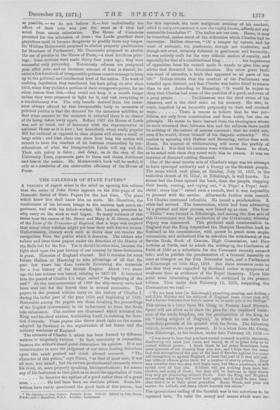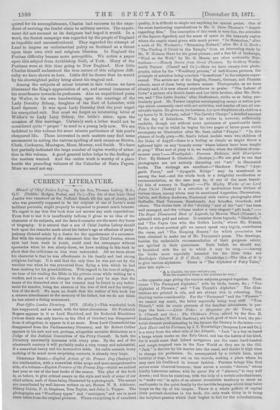THE CALENDAR OF STATE PAPERS,*
A FEELING of regret arises in the mind on opening this volume that the name of John Bruce appears on the title-page of the Domestic Series of State Papers for the last time. The place which knew him shall know him no more. Mr. Hamilton, the continuator of his labours, brings to the onerous task much ex- perience, and with his fellow-worker, Mr. Lowson, promises to ably carry on the work so well begun. So many volumes of this series boar the names of Mr. Bruce and Mary A. E. Green, author of the Lives of the Princesses of Englund, that a hope was inspired that many other voluhies might yet bear their well-known names. Unfortunately, literary work such as theirs does not receive the recognition from the public which it deserves. The editors who collate and issue these papers under the direction of the Master of the Rolls toil for the few. Yet it should be otherwise, because the light shed upon the past history of our country by these documents is great. Histories of England abound. But it remains for some future Hallam or Macaulay to take advantage of all that the past few years has done towards furnishing the materials for a true history of the British Empire. About two years ago the last volume was issued, relating to 1637-38. It launched into the period of Charles L's reign called "the beginning of the end." At the commencement of 1638 the ship-money writs had been sent out for the fourth time in annual succession. The papers in the present volume carry on the history of Charles during the latter part of the year 1638 and beginning of 1639. Noticeable among the papers are those detailing the proceedings of the English Government in its endeavours to force the Scots into submission. The motives are illustrated wbich actuated the King and his chief advisor, Archbishop Laud, in resisting the Scot- tish demands, These papers also throw much light on the course adopted by Scotland in the organization of her forces and the military weakness of England.
The estimate of Charles I. which has been formed by different writers is singularly various. In fact, unanimity is impossible, because the writer's stand-point determines his opinion. It is not uninstructive to note the judgment of our three leading historians upon this much praised and mulch abused monarch. The character of this prince," says Hume, "as that of most men, if not all men, was mixed ; but his virtues predominated extremely above his vices, or, more properly speaking, his imperfections ; for scarce any of his faults rose to that pitch as to merit the appellation of vices
he deserves the epithet of a good rather than of a great man He had been born an absolute prince. Some his- torians have rashly questioned the good faith of this prince ; but
* The Calendar of State Papers. Dommtic Scries, 1658-35, Edited by Jelin Brueo, F.S.A,, and— tun, F. B.A. Loudon; 3...unmans, for this reproach, the most malignant scrutiny of his conduct, which in every circumstance is now thoroughly known, affords not any reasonable foundation ?" The italics are our own. Hume, it may be remarked, makes much of the difficulties which Charles had to. encounter. Hallam observes, " Of a temper by nature, and by want of restraint, too passionate, though not vindictive, and though not cruel, certainly deficient in gentleness and humanity, he was entirely unfit for the very difficult station of royalty, and
especially for that of a constitutional king his impatience of opposition from his council made it unsafe to give him any advice that thwarted his determination. His other groat fault was want of sincerity, a fault that appeared in all parts of his life." Hallam thinks that the conduct of his Parliament was founded upon distrust, and that Charles was better fitted to reason than to act. According to Macaulay, " It would be unjust to deny that Charles had some of the qualities of a good, and even of a great prince Faithlessness was the chief cause of hie disasters, and is the chief stain on his memory. He was, in truth, impelled by an incurable propensity to dark and crooked
ways There is reason to believe that he was per-, Mous, not only from constitution and from habit, but also on principle. He seems to have learned from the theologians whom, he most esteemed that between him and his subjects there could be nothing of the nature of mutual contract ; that he could not, even if he would, divest himself of his despotic authority." We confess to agreeing with Hallam and Macaulay, rather than with Hume. No amount of whitewashing will cover the perfidy of Charles I, Not that hie enemies were without blame. In short, as he acted with them they acted with him in return. It was an instance of diamond cutting diamond.
One of the most unwise acts of Charles's reign was his attempt to force episcopal authority and a liturgy on the Scottish people. The scene which took place, on Sunday, July 23, 1637, in the cathedral church of St. Giles', in Edinburgh, is well known. No sooner had the Dean opened the book, than the people, clapping their hands, cursing, and crying out, " A Pope I a Pope! Anti- christ I stone him!" raised such a tumult, that it was impossible to proceed with the service. Afterwards further riots ensued_ Yet Charles continued inflexible. He issued a proclamation. A. crisis had arrived. The insurrection, which had been advancing by a gradual and slow process, now blazed up at once. The four " Tables " were formed in Edinburgh, and among the first acts of this Government was the production of the COVENANT, whereby Popery was renounced. This produced such consternation in England that the King despatched the Marquis Hamilton back to Scotland as his commissioner, with power to grant more ample concessions, and authorized him to sanction the withdrawal of the Service Book, Book of Canons, High Commission, and Five Articles of Perth, and to admit the setting-up the Confession of Faith of 1580 as a substitute for the Covenant recently entered into ; and to publish the proclamation of a General Assembly to. meet at Glasgow on the 20th November next, and a Parliament, at Edinburgh on 15th May, 1639. But these measures came so late that they were regarded by Scotland rather as symptoms of weakness than as evidences of the Royal clemency. Upon this. point some interesting information is contained in the present volume. Thus under date Feburary 12, 1639, respecting the Covenanters we read :— We are busy here [in Edinburgh] preaching, praying, and drilling;. and if his Majesty and his subjects of England come hither they will find a harder welcome than before, unless we be made quit of the Bishops.'
This occurs in a letter from Mr. Craig to Francis Lord Stewart_ Spacewill not allow us to show the plan for the combined resist- ance of the whole kingdom, nor the proclamation of the King to his " loving subjects of England," in which ho sets forth the immediate grounds of his quarrel with the Scots. The following extract, however, we must present. It is a letter from Mr. Craig, from Edinburgh, to his brother, under date February 12, 1639
I was sorry to hear that you have vented yourself in public discourse, disallowing our most just cause, and taxing us of so great folly as to contest without power. I think there be not many Seetehmen born more ignorant of our country than you are ; and I hope that the same. God that strengthened the arm of the land of Sweden against Germany will strengthen us against England, at least that part of it that will con- test without offence given them for a number of scurvy priests. They may consider that war may well begin hero, but like a pestilence, it wilt spread over all this isle. Soldiers will got nothing from here but strokes, and many of them ; but they will be desirous to fight where. they may get plundering without blows. Both the King and England are rending what they will never knit again, and it shall bo seen here- after that it is to their great prejudice. Knox, Welch, and your old master, Dr. Liddell, and many others foretold this storm," The ignominious ending of the Scottish war is too notorious to be repeated here. To raise the money and means which were re-
quired for its accomplishment, Charles had recourse to the expe- dient of reviving the feudal claim to military service, The experi- ment did not succeed as its designers had hoped it would. In a word, the Scotch campaign was regarded by the people of England as impolitic and unconstitutional. They regarded the attempt of Laud to impose an ecclesiastical polity on Scotland as a threat upon their own civil and religious liberties. In England the Puritan difficulty became more perceptible. We notice a paper upon this subject from Archbishop Neill, of York. Many of the Puritans were at this time going to Now England. Ilow little Charles himself understood the true nature of this religious diffi- culty we have shown us here. Little did he dream that he would by his shortsighted policy bring about his tragical end.
Among the subjects of minor interest in this volume we have illustrated the King's appreciation of art, and several instances of his munificence towards its professors. Also an unpublished poem by Waller, in his own handwriting, upon the marriage of the Lady Dorothy Sidney, daughter of the Earl of Leicester, with Lord Spencer. It was upon Lady Dorothy that the poet urged his unrequited suit. Nor must we forget an interesting letter of Waller's to Lady Lucy Sidney, the bride's sister, upon the occasion of this marriage. Certainly such a letter would not be considered quite " proper " to send to a young lady now. We are indebted to this volume for some minute particulars of this poet's chequered life. Those interested in such matters may find some amusement in noting the various spelling of such names as Brown, Clerk, Cockayne, Montague, Moor, Murray, and Smith. We have but partially indicated the large number of topics worthy of atten- tion in this volume. A good general index helps to the finding of the matters wanted. And the entire work is worthy of a place beside the preceding volumes of the Calendar of State Papers. More we need not say.











































 Previous page
Previous page